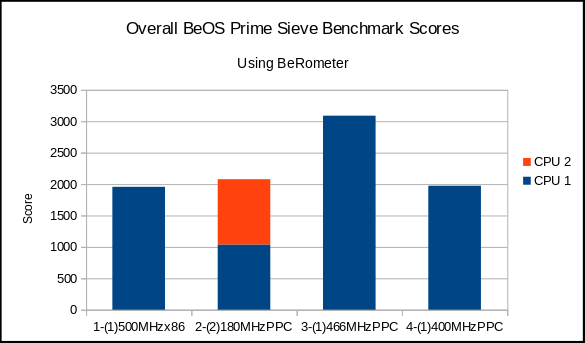No Benchmarking is ever perfect, more so when dealing with multi-processor machines. The only valid way to access performance for your needs is to measure performance in your specific workflow. If you can’t tell the difference, perhaps it is a sign that really you don’t need to pay the extra for the fancy machine!
This said, with retro computers it can be fun to compare performance, between platforms (PPC and x86), processors (603 and 604, or Intel and AMD) or configurations (single processor or multi processor). I started trying to write a multi-threaded benchmark myself but hit several issues. I’m not very familiar with BeOS, I’m not familiar with writing benchmarks and… I’m not a programmer. Thankfully I recently learned of a period benchmarking program called BeRometer that was available for both PPC and x86 versions of BeOS. For convenience, I have uploaded copies of all of the versions I was able to find and have linked to them below.
PowerPC
- Berometer 1.1.3 – https://elephantandchicken.co.uk/downloads/BeRometer/PPC/BeRometer-1.1.3_PPC.zip
- Berometer 1.2.0 – https://elephantandchicken.co.uk/downloads/BeRometer/PPC/BeRometer-1.2.0_R4_PPC.zip
- Berometer 1.2.1 – https://elephantandchicken.co.uk/downloads/BeRometer/PPC/BeRometer-1.2.1_R4_PPC.zip
x86
- Berometer 1.1.3 – https://elephantandchicken.co.uk/downloads/BeRometer/x86/BeRometer-1.1.3_x86.zip
- Berometer 1.2.1 – https://elephantandchicken.co.uk/downloads/BeRometer/x86/BeRometer-1.2.1_R4_x86.zip
- Berometer 1.2.4 – https://elephantandchicken.co.uk/downloads/BeRometer/x86/berometer-1.2.4_x86.zip
- Berometer 1.2.5 – https://elephantandchicken.co.uk/downloads/BeRometer/x86/BeRometer-1.2.5.zip
- Berometer 1.2.6 – https://elephantandchicken.co.uk/downloads/BeRometer/x86/BeRometer-1.2.6.zip
Notes on Berometer Downloads
Version 1.2.1 is the newest version available for both PowerPC and x86 systems. I’d suggest making new comparisons with this version so we can compare like-for-like. If you have the PowerPC version of a newer version, please let me know! I have a contact form under the About menu on the website.
Version 1.2.1’s built in results (only apparently fully available after you run (all of) the benchmarks yourself!) only include systems up to 604e or 604ev for PowerPC, and a small number of Pentium 3 systems (the fastest being a dual 500MHz Pentium 3) for x86.
Versions 1.2.4 contains a few more benchmarks, including two G3 upgraded PPC systems and more, newer / higher clock systems on the x86 side. Version 1.2.5 has removed the majority of PowerPC systems and version 1.2.6 contains no PowerPC data at all. As such, for looking up baseline systems, I’d recommend using the 1.2.4 version (potentially in an emulator such as VirtualBox if you don’t have a suitable PC to run x86 BeOS).
BeNchmark Scoreboard
The following will be a list of benchmark results for retro BeOS systems still running in 2024 (and onwards). Please submit a saved benchmark result file from version 1.2.1 of Berometer to “berometer” at this domain, along with a name or nick and a brief description of the computer (make, model, RAM, video card, processor, processor count, disk type and version of BeOS, including any particular patches or system enhancements) that you would like associated with the result. I’ll likely present results based on the Prime Sieve results, for no particular reason other than to avoid complicating things.
This isn’t contest and personally, I’d be very interested to see the performance of as broad cross section of machines and processors as possible.
Please don’t submit scores for emulated / virtualised machines as I would like to concentrate on real hardware, and the system clocks are often less accurate in emulators and virtual machines, resulting in poor quality scores regardless.
Overall Rankings
I suspect that the 400MHz Sonnet G4 in the follow benchmarks is using the motherboard slow / small L2 cache instead of the fast cache, because the performance nowhere near scales compared to the 466MHz G3.


PowerPC Rankings
<under construction>
x86 Rankings
<under construction>
Hobbit Rankings
<under construction>
First person to submit a benchmark score for an AT&T Hobbit wins the internet.